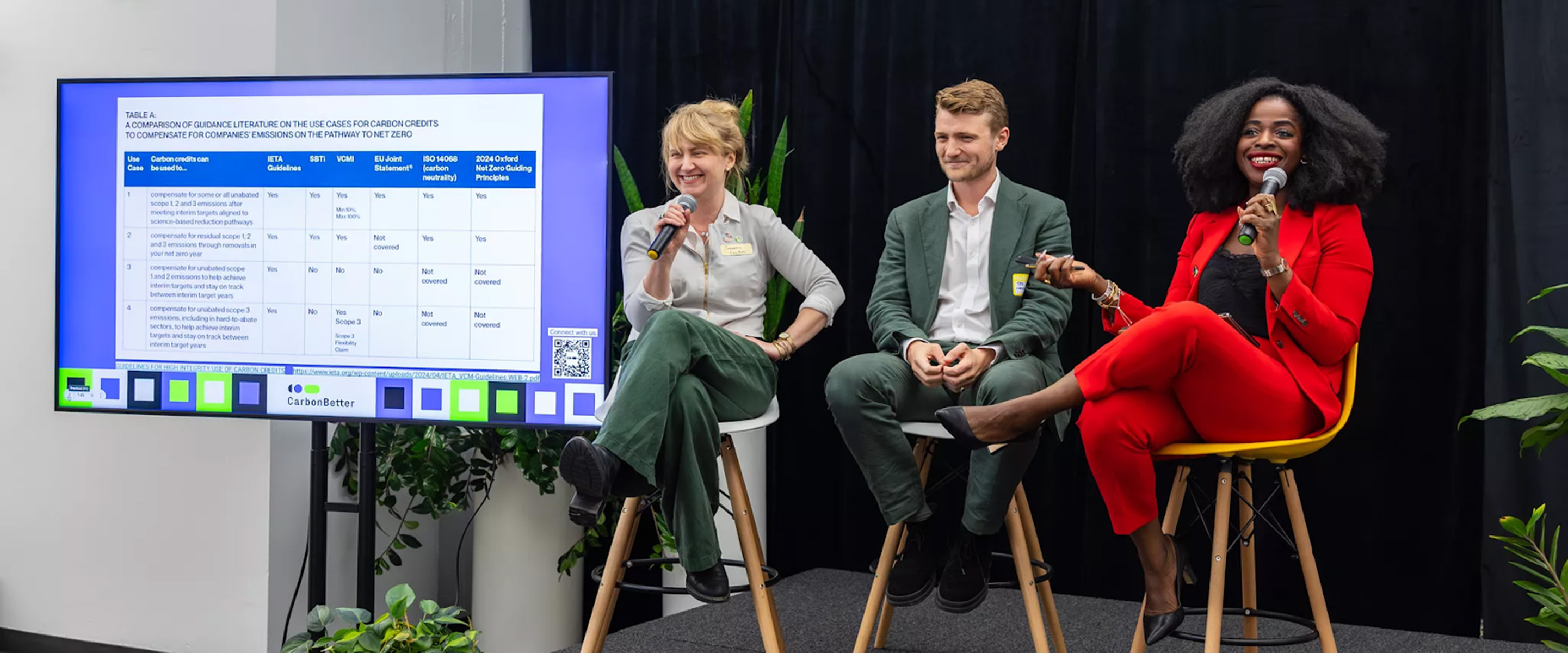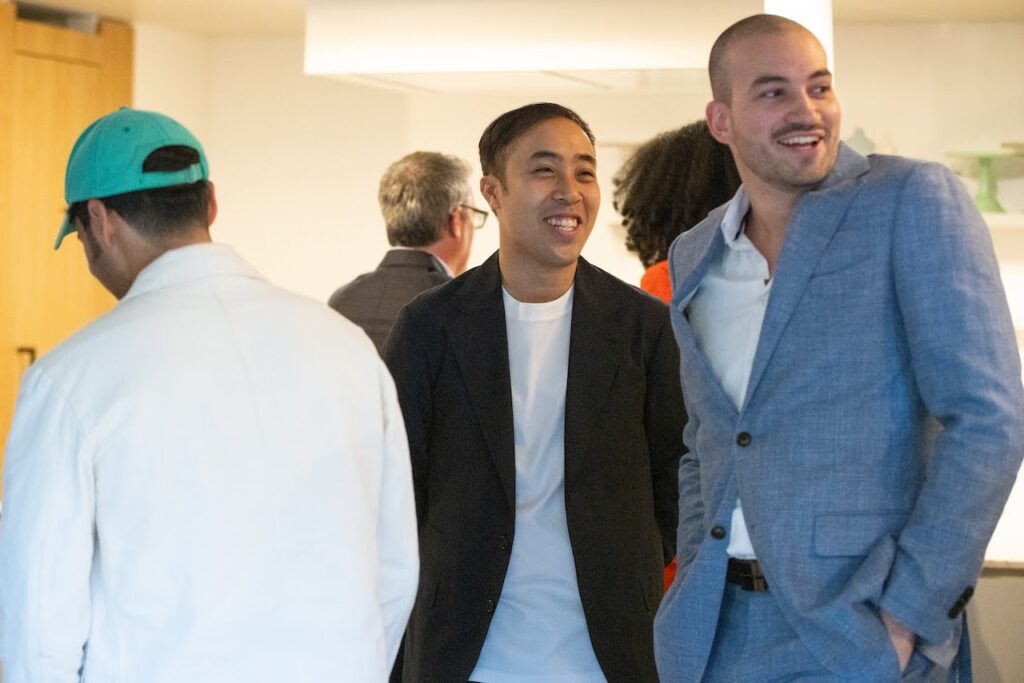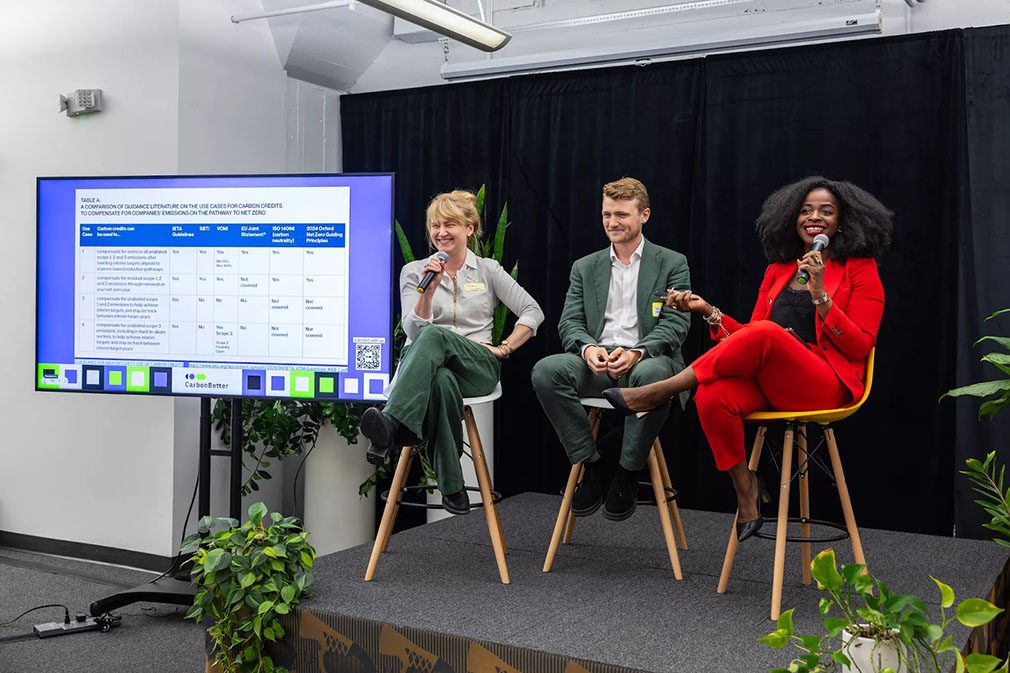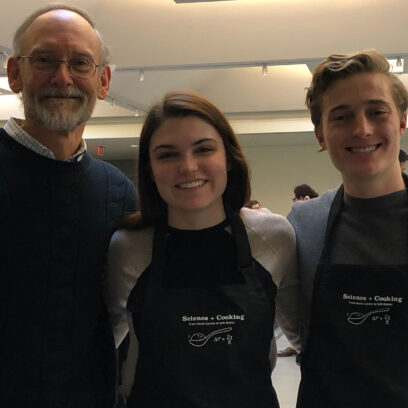Our Reflections on SF Climate Week and Looking Toward NYCW 2024


As climate-related disclosure and mitigation requirements continue to evolve, understanding the latest regulatory landscape is essential for US companies. In this webinar, we cut through the jargon to provide clear insights into emerging climate-related requirements, breaking down two key federal proposals and one EU regulation impacting some US-based companies. Join us to stay informed and prepared for what’s ahead in climate compliance.
SF Climate Week 2024 focused on scaling CDR technologies, innovative financing, and enhancing transparency in the carbon market.
Did you know there have been more than 22 climate conferences since the start of 2023? Picture a NYC Climate Week that is more nimble and focused on scaling tech and partnerships: You have SF Climate Week 2024. In just its second year, SF Climate Week jumped into a major industry gathering, drawing 15,000+ attendees across 300+ events. SF Climate Week events had a much more tech-focused orientation than NY Climate Week. Topics ranged from Climate & AI Summit to Exploring the Climate Capital Stack to Funding Climate Tech Innovation in Latin America. 9Zero served as a gathering spot for many of the climate tech events. Of course, AI dominated the landscape of topics. Carbon management, climate jobs and “climate newbies” were also big themes.
CarbonBetter’s Engagement at SF Climate Week
Our team may have recently returned buried under email follow-ups, but rejuvenated and excited. On the ground, Sarabeth, Tri, and Pankaj participated in various panels, met incredible individuals, and were introduced to new technologies that continue to build the foundation for the private sector to meet global climate commitments. Our unique position in the carbon management market allowed us to think through two parts of the challenge facing corporate uptake today: scale and education.
The Time is Now: The Urgent Case for Scaling Carbon Dioxide Removal
- Carbon dioxide removal is one of the most important tools we have to deliver net-zero and will play a crucial role in achieving global decarbonization.
- What will it take to reach carbon removal targets and how can we inspire urgent action across stakeholders, including governments, buyers, suppliers, standard-setters, investors, and communities?
For CarbonBetter, SF Climate week began with a flagship Goals House High Level Dinner that explored how nature-based solutions, disruptive climate technologies, and carbon markets are essential to unlocking net-zero. Headlining that night were fantastic speakers challenging and changing how the private sector thinks about carbon dioxide (CO2) removal—Dr. Vanessa Z. Chan, Chief Commercialization Officer, US Department of Energy (DOE); Suzanne DiBianca, Chief Impact Officer, Salesforce; Tom Chi, Founding Partner, At One Ventures; and Maria Streshinsky, Executive Editor, WIRED, who joined us as a moderator of this dynamic group. Throughout the night we took an introductory look at the big picture—United States (US) priorities of balancing investments in climate tech, delivering immediate energy needs, and prioritizing net-zero.
Some of the talking points were as follows:
- Carbon removal state of play, as the US needs the capacity to draw down a gigaton of CO2 by 2050 to meet net-zero goals
- To do so, the US needs to spend roughly $100 billion a year on CDR in order to scale up to a level that would help the country meet its climate goals.
- What is driving the DOE’s approach, and what can people in the room investors and tech leaders do to support?
Financing Climate Solutions
We believe sharing knowledge among groups like this helps address the interdisciplinary challenge of climate change. The conversation of financing mechanisms and scaling strategies moved forward into a discussion of how project finance has evolved over the past few years, especially when taking into account the passage of the Inflation Reduction Act (IRA), which our former Senior Director of Climate Services, Sarabeth Brockley described as “the greatest investment in climate the world has ever made.”
With programs like the Greenhouse Gas Reduction Fund under the IRA, climate project finance has evolved into a world of fused public and private capital. Also, a much greater emphasis has been placed on community benefits and uplifting low-income and disadvantaged communities.





“Getting started in climate can be intimidating. The Carbon Newbie Summit aims to create a welcoming space for those new to climate and provide a strong foundation of knowledge and skills for accelerated and impactful climate action.”
Michelle Li, Founder Clever Carbon and Women and Climate
Skip the RFP—CarbonBetter can help
CarbonBetter Certified Offset Portfolios allow carbon buyers to participate in a variety of projects, geographies, and technologies in one simple transaction rather than navigating a lengthy and complex RFP process with multiple carbon market participants.
Learn More about CBCO 22-1We rounded out the evening with SF Mayor London Breed celebrating innovators in sustainability. Hosted by Ripple and Builders Vision, the reception focused on unlocking the immense potential of the blue carbon ecosystem and closing the financing gap, establishing a chain of trust from emissions through trading. As oceans flow through all 17 of SDGs, connecting Trust, Transparency, & the Blue Carbon Economy is imperative. The energy in the room, the intent of the conversations, and the sharing of new technologies and products—some already developed—galvanized everyone to remain steadfast on this crucial mission.

Carbon Newbie Summit Highlights
We were also happy to continue to support the work of a few others spearheading education efforts in Carbon Markets. During SF Climate Week, we co-sponsored Carbon Newie Summit (CNS), a Clever Carbon initiative. Its founder, Michelle Li, convened experts at Allbirds for a half day session, inviting newbies to join in the climate conversation. Advertised as a casual conference for carbon newbies interested in getting the 101, 201, and maybe 301 on carbon, it featured experts and professionals from the United Nations (UN), NBA, Allbirds, Mastercard, Asana, DocuSign, CarbonBetter, Catona Climate, Mitsubishi Corporation, and more.
The inaugural Carbon Newbie Summit (CNS) took place in New York City during NY Climate Week in 2023. Speakers from the world’s most valuable brands were present to share their work on carbon and carbon literacy including Allbirds, Mastercard, the NBA, Bloomberg, United Nations, and Nasdaq.



The goal of CNS is to create a safe space for more people to learn about climate. Climate spaces and networking can be very intimidating for newbies, and events during Climate Week are often gated and those that are not working in climate may not get in. CNS is a space made just for newbies, providing them with information and inspiration for their personal and professional lives with the goal of accelerating climate action.
Our event was a hit at SF Climate Week with over 500 attendees. The CNS also brought in experts and speakers from the Golden State Warriors, DocuSign, Allbirds, Asana, Mitsubishi Corporation, BeZero Carbon, Goals House, and more in its second iteration.As we continue to partner with first movers and leaders on carbon management, we also know how important it is to include all stakeholders across the value chain.
As we reflect, here are four main takeaways we'd like to share:
- Progress in Climate Conversations: Although we still have a long way to go, and it's disheartening to hear that we're not fully on track to meet climate goals, the energy at SF Climate Week reinforced that changes, when they occur, happen faster than we can project. Conversations have evolved to be more earnest, collaborative, and less proprietary compared to last year. Probably the most interesting player was the Government: The DOE was present at SFCW, with Vanessa Chan from OTT providing a common ground for commercialization through Adoption Readiness Levels (ARL) and Liftoff Reports (including their latest on gridtech). Beyond frameworks and funding, the DOE also emphasized its extensive scientific resources through its 17 national labs, where programs like Labstart and Activate have emerged to bring new technologies to market. It’s powerful to hear the private sector tell us that the U.S. DOE is really making an impact.
- Financing All Solutions: Throughout the week, we heard constantly that “you can’t solve climate with SaaS.” If the myriad of interventions and climate solutions being pursued are overwhelming, then out-of-the-box ideas are what the world needs. Climate tech carries novel and idiosyncratic types of risk that traditional financiers have struggled to price. These gaps "Missing Middle" or “First Of A Kind” (FOAK) can prevent important climate tech companies and projects from realizing impact. To mitigate, startups can bring on strategic finance personnel; financiers can bring in technical folks and develop novel instruments. It's easier for climate companies to get enough funding to get started. It's much harder once they need money to scale.
- Potential of Carbon Credits: There was significant discussion and alignment around the potential of carbon credits to meet climate goals and the need for increased financing for both nature-based and technological solutions to remove or avoid carbon emissions. Market analysts appear to be just as confused as buyers. In its latest carbon market report, BloombergNEF described an all-or-nothing future. The VCM could either be on its way to reaching $1.1 trillion in value, or we could soon see the “death of the broader market.” Financing for FOAK projects, enabling and measuring community/ecological and biodiversity benefits, and the need for platforms that bring buyers and sellers of credits together were key topics.
- Importance of Robust LCA Assessments: As innovators use technology to develop new products, conducting robust Life Cycle Assessments (LCAs) is becoming increasingly important. During the week, we encountered innovations in the food sector and ferry transportation, among others, where companies are developing new forms of sugars, cheese, and zero-carbon boats that claim to provide health and social benefits while supporting sustainability. As more novel products enter the market, the need for conducting robust LCA assessments will further increase to support the claims made by these products and to accurately measure their impact on respective supply chains.
Conclusion
While Climate Week NYC remains a fixture on the political calendar, SFCW is now the technological juggernaut, willingly challenging our assumptions on how we create enabling conditions. Or to put it another way: Climate tech builders balance their passion with pragmaticism, focusing their time and energy into solutions that will have a material impact on climate change.
As climate weeks NY and SF demonstrate the educational, connective, and catalytic opportunities to careers in climate, it also highlights the need for more local climate tech ecosystems. We will see you there at London Climate Week and onward to Climate Week NYC returning with an urgent message: It’s Time.
What's one good question you heard at SF Climate Week that got you thinking bigger or expanded your understanding of a problem? We would love to talk as you build your own carbon management journey.
SF Climate Week 2024 showcased a wide range of discussions focusing on the scaling of carbon dioxide removal technologies, the intricacies of the voluntary carbon market, and innovative financing mechanisms for climate projects. Key themes included the alignment of business strategies with global climate commitments, the role of government in supporting technology commercialization through policies, and the development of new platforms to facilitate carbon credit transactions.
A critical takeaway is the growing consensus on the potential of nature-based and technological solutions to achieve climate targets, emphasizing the need for robust financing models. Additionally, the discussions underscored the importance of non-traditional approaches in climate tech, recognizing that overcoming the challenges of scaling requires innovative risk management and financing solutions.
Insights from SF Climate Week are likely to steer future sustainability strategies towards more collaborative and cross-sector approaches, with a strong focus on transparency and traceability in carbon markets. The discussions also highlighted the importance of adopting and adapting to new technologies that can provide verifiable benefits in terms of carbon reduction, suggesting a shift towards more integrated and practical solutions in the sustainability sector.

About the Author
Pankaj Tanwar is Managing Director of Climate Services at CarbonBetter. He has experience leading Fortune 100 companies through their sustainability journeys, including sustainability driven growth in the food industry. Pankaj holds an MBA from Northwestern University’s Kellogg School of Management and a BTech in Mechanical Engineering from the Indian Institute of Technology, Kanpur.



